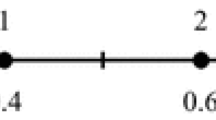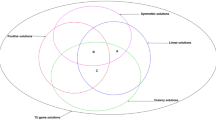Abstract
Multinomial values were previously introduced by one of the authors in reliability and extended later to all cooperative games. Here, we present for this subfamily of probabilistic values three new results, previously stated only for binomial semivalues in the literature. They concern the dimension of the subspace spanned by the multinomial values and two characterizations: one, individual, for each multinomial value; another, collective, for the whole subfamily they form. Finally, an application to simple games is provided.

Similar content being viewed by others
Notes
In particular, all binomial semivalues, but also the Shapley value, satisfy this property.
The reader might well like to see this argument illustrated for, say, \(n=4\). Let, e.g., \(\mathbf{p}=(p_1,p_2,0,0)\) with \(p_1,p_2>0\). For singletons, we have \(\phi _i[u_{\{j\}}]=1\) if \(i=j\) and 0 otherwise. For any other nonempty T, \(\phi _i[u_T]=0\) if \(i\notin T\). Coalition \(\{1,2\}\) is the only of type (a), and we get \(\phi _i[u_{\{1,2\}}]=p_j\) if \(\{i,j\}=\{1,2\}\). Next, for coalitions \(\{1,3\}\), \(\{1,4\}\), \(\{2,3\}\), \(\{2,4\}\), \(\{1,2,3\}\) and \(\{1,2,4\}\) we have \(\phi _i[u_T]=0\) if \(i=1,2\). Then, from \(\phi _1[u_{\{1,2,3\}}]+\phi _2[u_{\{1,2,3\}}]+\phi _3[u_{\{1,2,3\}}]=p_1p_2\) we find \(\phi _3[u_{\{1,2,3\}}]=p_1p_2\), and something analogous occurs for the remaining coalitions of the list. Finally, for \(\{3,4\}\), \(\{1,3,4\}\), \(\{2,3,4\}\) and N, we find \(\phi _i[u_T]=0\) for all \(i\in N\). Here, we are exclusively applying, as in the proof of Theorem 4.6, linearity (of course), positivity, the dummy player property, the \(\mathbf{p}\)-multinomial total power property, and the property of \(\mathbf{p}\)-weighted payoffs for unanimity games.
The dictatorial index \(\psi ^0\) satisfies (i) only, with \(p_0=1\) and \(\mu =0\). The marginal index \(\psi ^1\) satisfies (ii) only, with \(p_{n-1}=1\) and \(\mu '=0\). Any other binomial semivalue, with \(q\ne 0,1\), satisfies (i) and (ii) because \(\mu =\dfrac{1-q}{q}\ne 0\); thus, \(q=\dfrac{\mu }{1+\mu }\) and \(p_0=\dfrac{1}{(1+\mu )^{n-1}}\).
We use this term to emphasize that exceptionality corresponds to the next option, that of magnetic player.
Some points of the argument that follows are well illustrated by, e.g., the particular case \(n=4\).
References
Alonso JM, Carreras F, Puente MA (2007) Axiomatic characterizations of the symmetric coalitional binomial semivalues. Discret Appl Math 155:2282–2293
Amer R, Giménez JM (2003) Modification of semivalues for games with coalition structures. Theory Decis 54:185–205
Carreras F (2004) \(\alpha \)-decisiveness in simple games. Theory Decis 56:77–91 [Also in: Gambarelli G (ed) Essays on cooperative games. Kluwer Academic Publishers, pp 77–91]
Carreras F (2005) A decisiveness index for simple games. Eur J Oper Res 163:370–387
Carreras F, Puente MA (2012) Symmetric coalitional binomial semivalues. Group Decis Negot 21:637–662
Carreras F, Puente MA (2015a) Multinomial probabilistic values. Group Decis Negot 24:981–991
Carreras F, Puente MA (2015b) Coalitional multinomial probabilistic values. Eur J Oper Res 245:236–246
Domènech M, Giménez JM, Puente MA (2016) Some properties for probabilistic and multinomial (probabilistic) values on cooperative games. Optimization 65:1377–1395
Dubey P, Shapley LS (1979) Mathematical properties of the Banzhaf power index. Math Oper Res 4:99–131
Dubey P, Neyman A, Weber RJ (1981) Value theory without efficiency. Math Oper Res 6:122–128
Feltkamp V (1995) Alternative axiomatic characterizations of the Shapley and Banzhaf values. Int J Game Theory 24:179–186
Freixas J, Pons M (2015) An axiomatic characterization of the potential decisiveness index. J Oper Res Soc 66:353–359
Freixas J, Puente MA (2002) Reliability importance measures of the components in a system based on semivalues and probabilistic values. Ann Oper Res 109:331–342
Giménez JM, Llongueras MD, Puente MA (2014) Partnership formation and multinomial values. Discret Appl Math 170:7–20
Owen G (1972) Multilinear extensions of games. Manag Sci 18:64–79
Owen G (1975) Multilinear extensions and the Banzhaf value. Nav Res Logist Q 22:741–750
Owen G (1978) Characterization of the Banzhaf–Coleman index. SIAM J Appl Math 35:315–327
Puente MA (2000) Contributions to the representability of simple games and to the calculus of solutions for this class of games (in Spanish). Ph.D. Thesis. Universitat Politècnica de Catalunya, Spain
Shapley LS (1953) A value for n-person games. In: Kuhn HW, Tucker AW (eds) Contributions to the theory of games II. Annals of mathematical studies, vol 28. Princeton University Press, Princeton, pp 307–317
Weber RJ (1988) Probabilistic values for games. In: Roth AE (ed) The Shapley value: essays in honor of Lloyd S. Shapley. Cambridge University Press, Cambridge, pp 101–119
Acknowledgements
The authors wish to thank two anonymous reviewers for their helpful comments.
Author information
Authors and Affiliations
Corresponding author
Additional information
This research project was partially supported by funds from the Spanish Ministry of Economy and Competitiveness (MINECO) and from the European Union (FEDER funds) under Grant MTM2015-66818-P (MINECO/FEDER).
Rights and permissions
About this article
Cite this article
Carreras, F., Puente, M.A. A note on multinomial probabilistic values. TOP 26, 164–186 (2018). https://doi.org/10.1007/s11750-017-0464-1
Received:
Accepted:
Published:
Issue Date:
DOI: https://doi.org/10.1007/s11750-017-0464-1




